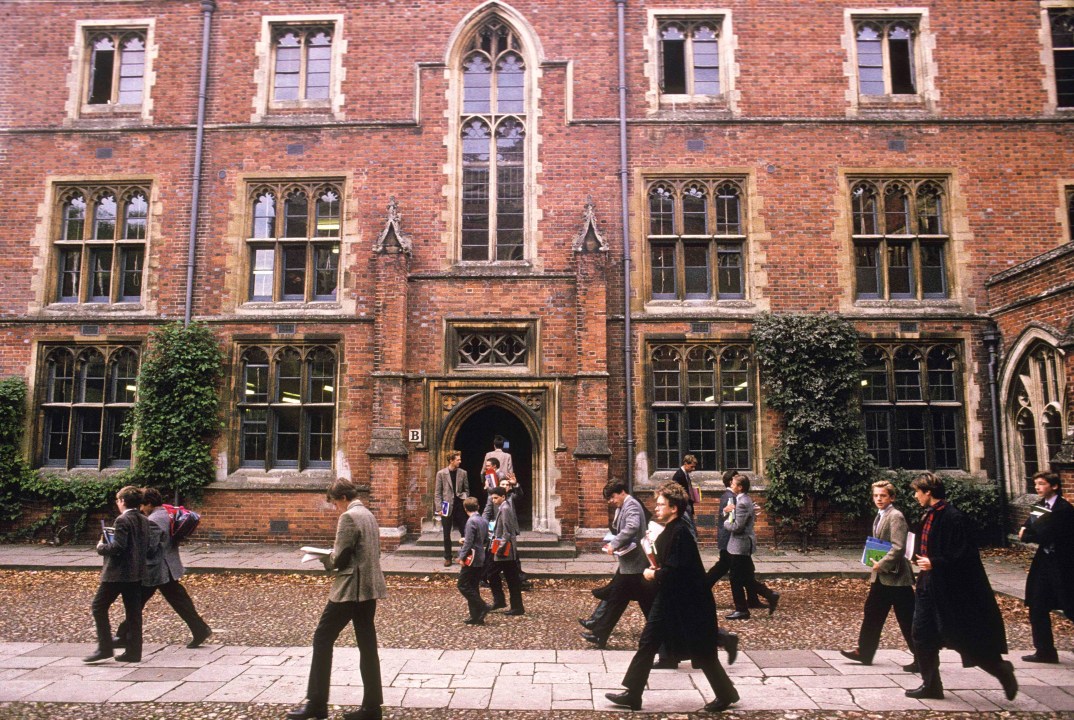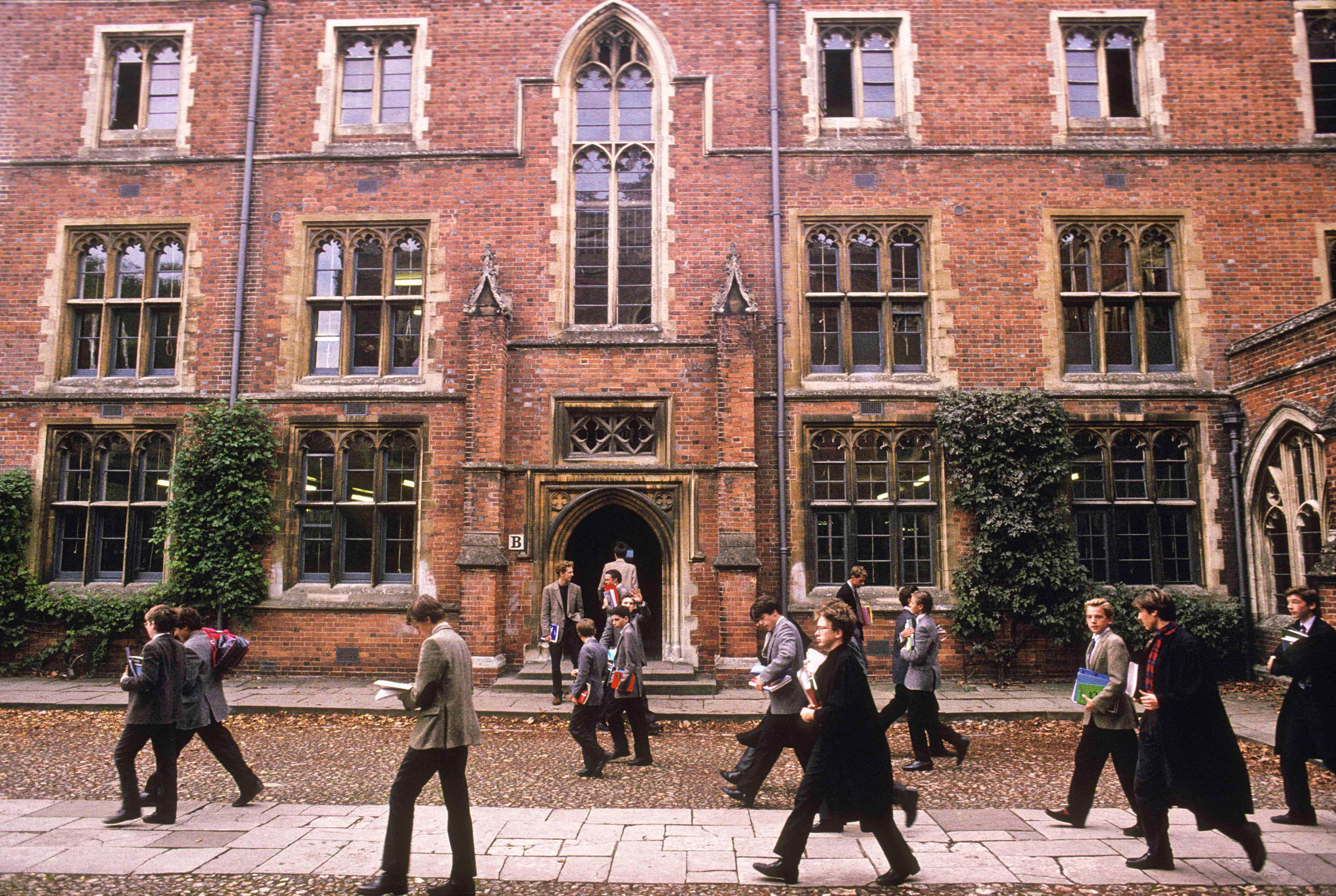The first thing that Dr Tim Hands, headmaster of Winchester College, would like to clear up is his school’s world-famous motto, ‘Manners maketh man’. Whenever a Wykehamist makes the papers, this ancient phrase is wheeled out, referring to his (in)decent manners. But this isn’t quite right, says Hands.
Two pieces of stained glass — one formerly in Bradford Peverell church near Dorchester, and another in the Warden’s Lodgings at New College Oxford (founded by Winchester’s founder Bishop William of Wykeham) — read ‘Manner maketh man’. This, says Hands, is the origin for the school’s motto. ‘“Manner” means what you are and what you do — not how you fold your handkerchief.’ And so, although Winchester’s is probably the best-known school motto out there, ‘it is probably the least well-understood’.
Last month, the public school made headlines as Hands, 64, who became headmaster of Winchester in 2016, following a headship at Magdalen College School, Oxford, announced that from autumn next year, girls would be introduced to the sixth form as day pupils. From 2024, the school will become fully co-educational, leaving only Eton, Harrow and Radley as boys-only, full-boarding schools.
There is no school uniform, but a glossary to learn: ‘Up to books’ means to be ‘in school and in lessons’, non-scholars are called ‘commoners’, and a 35-minute lesson is termed an ‘hour’
This is not so outrageous: introducing girls to Winchester has been mooted since 1899. And Hands has some experience in the co-ed transition, having managed the same move at MCS in 2012. ‘The younger boys looked at the girls as older sisters, and it was more like a family relationship than a school relationship,’ he says. This is his hope for Winchester, which turns 640 next year.
The alumni are supportive: ‘I would have expected a very conservative old pupil body, but the older they are, the more they are in favour.’ But while Hands also feels at ease with girls joining the school now, he has not always held that view. As a housemaster at the co-ed King’s School, Canterbury, when girls were only in the sixth form, ‘I was opposed to it’.
The son of two teachers, Hands was educated at grammar school in London before studying violin at the Guildhall, reading English at King’s College London and gaining a doctorate from Oxford, where he lectured in English. The author of three books on Thomas Hardy, in his spare time he enjoys watching rugby — ‘alas we don’t play it here’ — and writing, especially ‘parody things, like the Spectator competition’.
Once, as chairman of the Headmasters’ and Headmistresses’ Conference, he surveyed heads and found that about a third were English teachers. ‘English teachers sell you double-glazing, inventing imagery that will persuade you to believe them.’ The art of being a head is, then, ‘politics and double-glazing sales’, he chuckles. At job interviews he asks candidates where they’d go if a magic carpet could take them anywhere at any time. He’d choose ‘the apartment in Vienna where Mozart played string quartet with Haydn, just to look at the eye contact between them’.
Winchester College was founded in 1382 by William of Wykeham, making it ‘the original public school’, the oldest in continuous operation. The fees are £41,709 a year, and boys join at 13, with a reputation for being preternaturally clever. Hands cannot deny this, but adds: ‘The idea has come about that if you are a school for intellectuals then you can’t be one for sportsmen or musicians. That myth exists here, and I’d love to see the back of it.’
There is no school uniform, but a glossary to learn: ‘Up to books’ means to be ‘in school and in lessons’, non-scholars are called ‘commoners’, and a 35-minute lesson is termed an ‘hour’. The school has its own sport, Winchester College football, or ‘Winkies’, which, Hands says, is ‘very good pastorally — you need a range of skills including just standing there and stopping the ball’.
Every five years a document called ‘Long Roll’ is published, where ‘everyone’s name is put into Latin’. Hands tried to modernise this and have all the names in English, but the idea was met with ‘absolute fury’, so they have compromised. This year it will be printed double-sided. ‘Everything at Winchester is antique, but nothing is antiquated,’ remarks Hands. Wykehamists have cracked on with remote learning during the pandemic, but the past year, says Hands, has ‘completely lacked joy, and the kids can’t wait to be back’.
Preparing to interview Hands, I gathered snap judgments on Winchester. ‘Really smart,’ said an Old Etonian. ‘Quietly nicer than Eton,’ added a Tory researcher. Are the Eton comparisons fair? Partly — William Waynflete, an early headmaster of Winchester and founder of MCS, was the second Provost of Eton, later Bishop of Winchester, and Henry VI’s Lord Chancellor. Thus, the three schools share a figurehead, but produce rather different characters. Eton is responsible for 20 prime ministers, MCS a handful of Nobel prize-winners, and Winchester ‘produces judges and civil servants’, says Hands.
Their physical positioning is telling. Winchester is secluded, situated outside the city walls, while ‘Eton is a school of the court’, and MCS, opposite St Hilda’s, ‘remains the school of the university’. Hands observes that ‘Eton’s location near the court is neither coincidence or without consequence’. Neither of us can resist invoking the old joke about the Etonian, the Wykehamist, and the Harrovian: ‘An Etonian, a Wykehamist and a Harrovian are sitting in a bar. A woman walks in. The Etonian says, “Fetch that woman a chair”. The Wykehamist fetches it. The Harrovian sits in it.’ This translates as: ‘Etonians are there to give orders, and Wykehamists are there to execute them. We’ll leave the Harrow bit out of it.’
What does all of this say about Wykehamists? They are a varied bunch: Thomas Arnold, reforming headmaster of 19th century Rugby; the novelist Anthony Trollope; and Oscar Wilde’s lover Lord Alfred Douglas. Lefties Hugh Gaitskell and Seumas Milne; former Tory MP Nick Boles; chief of the defence staff General Sir Nick Carter; and Chancellor Rishi Sunak, who was head boy. Few are famously associated with the school, and for Hands, this is the goal. ‘It’s a sign of failure if you meet someone and think “they must be from X”, because the school should develop what the child is good at, rather than inflicting the school on them.’ He describes his charges as ‘very articulate and modest… I’m going to avoid the Rishi-Boris comparison here’. Eton has been described as Winchester’s ‘flashier younger brother’ but, Hands notes drily, ‘we have never appointed an Etonian as headmaster, whereas they have appointed four Wykehamists — including the current one’.







Comments